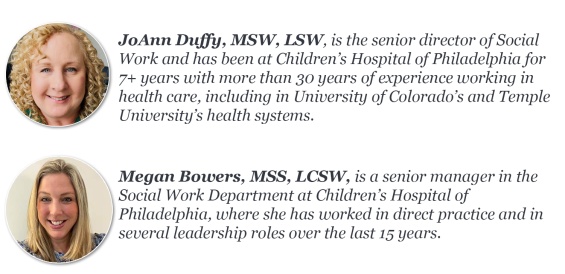Social Care at CHOP: The Evolution of a Tiered Response to Social Care Needs

The pioneers of Social Work in medical settings focused on the importance of human relationships, individual patient/family needs, and the social aspects of health and illness, and emphasized the value of interdisciplinary collaboration to provide the most effective care to patients and families. Health-related social needs can include food insecurity, housing instability, and difficulty paying for utilities as well as caregiver safety and mental health, to name a few. As we lean into the celebration of social workers in the month of March, it is important to highlight the significance of integrating social care into our health care encounters to address health disparities and improve population health.
The Department of Social Work at Children’s Hospital of Philadelphia (CHOP) is committed to the health and well-being of children and their families. We strive to cultivate meaningful relationships by honoring individual strengths and differences to empower children, families and the communities we serve. Social care is grounded in providing physical, emotional and social support to people in need. It is our strong belief that providing responsible social care that includes assessments, interventions, and connections in the community to help address these needs has a positive impact on the overall well-being of the patients and families in our care. The intersection of the social work profession and social care responsibility in health care settings positions CHOP social workers, social work care coordinators (bachelors-level social workers) and community health workers/community health navigators to advance organizational goals to support patients and families in the hospital, in ambulatory settings and in the community.
Using a tiered model of service, our goal through social care is to provide the right level of support, at the right time, by the right professional to reach patients and families in need effectively and efficiently. We meet patients and families where they are, providing the appropriate level of screening/assessment support and intervention needed at the point of care. In addition, we want to ensure continuous care beyond discharge or outpatient visit through successful follow up and solid connections to community services.
In some inpatient and outpatient settings across CHOP, the Social Work Department—in partnership with the Division of General Pediatrics, Primary Care, PolicyLab and the Center for Health Equity—is implementing this tiered response with social workers and social work care coordinators as well as community health workers/community health navigators. This care model involves these roles working together to respond to the social care needs of patients and families based on the degree of complexity and acuity involved in that patient/family’s psychosocial situation.
A key element of this tiered model of service is CHOP’s Community Resource Connects resource mapping tool. Social workers are experts at community networking and building relationships with community-based partners. With this expertise and our mission to identify critical care gaps for patients and families and the community services and programs that can meet those needs, social workers helped to support CHOP’s efforts towards resource mapping and have been important leaders and contributors to the development of Community Resource Connects. CHOP social workers’ valuable contributions in this space helped highlight the community services that are available to CHOP patients and families as well as validated published resources, making sure the right services were mapped in a user-friendly place for ease of access and connection.
Social workers use their skills in crisis management, empowerment, and advocacy to help patients and families get connected to immediate resources to support their needs and empower them with information and knowledge to shape their economic and social autonomy long term. Our goal and responsibility in social care is to assist patients and families with informed decision-making about the care and services they receive and equip them with the information and skills needed to navigate future challenges successfully.

